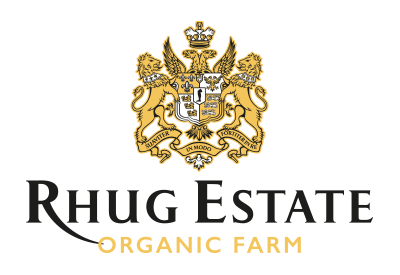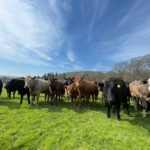“People need only seven seconds to decide” says Philip Hughes. He’s the estate manager at the Rhug Estate in Denbighshire. “That’s why we located the signs where they are. While the estate is very rural we are within two hours of one third of the population of the UK. About 60% of our visitors are travelling west towards the Snowdonia National Park. And we’re on the right side of the road for that essential comfort stop. The annual footfall here is about half a million.”
ESTATE ON A MISSION – Robert Dangerfield
At first sight, the Rhug appears to be all about tourism. Located in the Dee Valley, the A5 here provides one of the most accessible and pretty journeys in the country – a short distance beyond the Pontcysyllte Aqueduct world heritage site, and the town of Llangollen. You can drive parallel to the steam railway in the valley below – the quintessential Rev W. Awdry scene also put on canvas by JMW Turner in 1808. Philip’s ‘seven seconds’ principle is realised in a strong brand, an inviting shop, café and restaurant and the attraction of North American Bison – in the flesh, as premium meat cuts – or even as top quality burgers. Even on a March Monday the restaurant, the outdoor café and the shop were well attended by customers – purses and wallets in hand. A large sign near the entrance reads ‘Overflow Car Park’. If you need one of those you must be doing well, I think to myself.
Living by the estate’s values
Behind the shop is a strong organic farm business. Bison meat along with Welsh Lamb, Aberdeen Angus Beef, game and poultry provides a premium product exported to Hong Kong, Abu Dhabi, Dubai and Singapore and to a premium retail outlet in Southwalk. But premium beef is a main product here. We’re not just looking at slick and diversified agricultural enterprise, but a corporate entity. The Eighth Baron, Lord Newborough, is an innovative chief executive with vision and a huge sense of responsibility. The business features a clear corporate structure and his mission is clearly depicted in a corporate strategic model. It reads:
“We are proudly Welsh; we are caring; we have integrity; we have passion; we are socially responsible; we are constantly reliable; we are ethical.”
“Gentle in Manner, Vigorous in Action,” the motto below a historic aristocratic family crest is, today, defining the culture of a 21st century diversified and vertically integrated conglomerate business – a brand.
Philip explains: “Tourism is the most visible part of a multi-layered business model. It’s based on farming with its ancillary businesses in woodland, forestry and sports. However, our activity in meat processing, retail and renewable energy are not only standalones. They contribute to the success of the most visible parts.
“The Eighth Baron inherited a farm estate business nearly 20 years ago, but his personal mission has not only been to create an organic enterprise – but also progressively for is to be carbon neutral. These have been key parts of his personal vision that have become a corporate ethic.”
Energy opportunities
Philip says that renewable energy is “yesterday’s story”, now that that first wave of government support has digressed to relatively low tariff levels. But he remains confident. “We are not quite there but I foresee future opportunities here, yet to come”, he says. “Even without the incentives, it’s the right thing to do”.
He points to National Grid’s projections for the rapid move away from 58% carbon intensive energy sources in 2015 – to just 16% in 2040. “And we expect local energy generation – by people like us – will grow from a modest 23% in 2015 – to nearly half of UK energy by 2040.”
The Rhug Estate can generate as much as 6.4MW from 10 solar PV sites, 450KW from two wind turbines, there are four hydroelectric schemes delivering 250KW and seven ground/air heat pump systems. “I won’t say we’re carbon neutral as such – it’s hard to pin down a sound definition for the concept – but we believe we’re as close to this as practically possible,” he says. Remarkably, estate records show that what today call ‘renewable energy’ schemes – were already in operation in the first half of the last century.
It’s not to be underestimated how much the renewable schemes sustain other Rhug stakeholders. Sited on small airfield run by a tenant, two wind turbines and a bank of solar panels reduce energy consumption of that business and have helped it attracted new business. Philip says: “Wind is often present when solar light in not – and here, powered by clean wind directly from the sea at an average of eight metres per second – out main technical constraint is the capacity of the grid.”
Similarly the meat processing business benefits from solar installation to offset energy costs. The shop and restaurant are built to top BREEAM standards, and lighting, heating, refrigeration, freezers and ovens are all powered from renewables portfolio.
“There are other energy challenges we can help to tackle, too,” Philip begins with further relish. The estate includes over 170 tenanted agreements of various different kinds and many of these involve residential lets. “In the face of rising standards in environmental performance we’re replacing oil and LPG heating with renewable electric solutions. We’ve set up our own company, Freshfield Energy, which surveys properties and proposes solutions to gain the EPCs (energy performance certificates) which are often zero cost to landlord and result in reduced costs to the residents. Everyone’s a winner. The tenant has a state of the art sustainable solution, we’re meeting government housing and environmental targets and were future-proofing our housing stock”.
“There are greater efficiencies to be achieved. We need to improve the capacity of the grid”
Philip anticipates my rising doubt; “No, it hasn’t always been easy. We’ve had planning and technical issues to overcome, but, despite out sustainable vision of organic farming and renewable energy, some of the environmental concerns have been difficult to overcome. The statutory consultees such as NRW have an array of different priorities. And, of course, they are different in England and in Wales.
“I’m confident that there’s more to come,” Philip says. “There are greater efficiencies to be achieved. We need to improve the capacity of the grid and, especially, we can take advantage of technical improvements and cost reduction in energy storage.”
He anticipates that the incentives, shorter windows will open up for more corporate solutions, notably in voltage optimisation and storage. “But,” he says, “I think there’s likely to be a greater ingredient of financial risk.”
An eye on the future
A business driven by strong corporate values and a clear vision, the Rhug Estate’s priorities for the future are there to be seen. Philip says: “We still have options in traditional land development. Our response to current economic conditions has been to review and fix our borrowing arrangements and investment schedule at incredibly low lending rates that we doubt we will see again. And now that we are a board, complex and multi-faceted business we are creating a data management system to aid knowledge transfer and make information more accessible.
“My prime worry is for our farming communities who make their living on the upland areas as the subsidy system reduces in tandem with uncertainty over our export markets. This livelihood is at times marginal and vulnerable to change in market and commodity prices. Farm support coupled with long term export markets must continue to sustain this landscape and the community on it.”
The Rhug may have become a branded corporate entity – but Philip’s conscience stresses the strength of the historical bond between the land’s managers and the land community.






 Organic Beef
Organic Beef